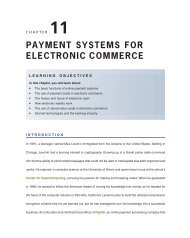ELECTRONIC COMMERCE SOFTWARE
ELECTRONIC COMMERCE SOFTWARE
ELECTRONIC COMMERCE SOFTWARE
You also want an ePaper? Increase the reach of your titles
YUMPU automatically turns print PDFs into web optimized ePapers that Google loves.
430<br />
Chapter 9<br />
Summary<br />
In this chapter, you learned about electronic commerce software for small, midsize, and large<br />
businesses and the functions provided by each software type. The electronic commerce software<br />
a company chooses depends on its size, objectives, and budget, and requires making<br />
major decisions. A company must first choose between paying a service provider to host the site<br />
and self-hosting. External hosting options include shared hosting, dedicated hosting, and<br />
co-location. Many hosting companies offer comprehensive services to merchants, such as databases,<br />
shopping carts, and content management, in addition to basic Web hosting services.<br />
Key elements of all electronic commerce software include catalogs, shopping carts, and<br />
transaction-processing capabilities. An important new way for companies to get their information<br />
systems to work across organizational boundaries is the implementation of Web services.<br />
Small enterprises that are just starting an electronic commerce initiative might use a commerce<br />
service provider (CSP). Basic CSP and mall-style hosting services for small businesses<br />
provide a range of standard features, including tools for quickly creating storefronts, catalogs,<br />
and transaction processing. These packages are usually wizard- and template-driven.<br />
If a company already has computing equipment and staff in place, purchasing a midrange<br />
electronic commerce software package provides more control over the site and allows for<br />
expansion. Midrange software can interact with database software to create dynamic catalogs<br />
and shopping carts and handle order processing.<br />
Large enterprises that have high transaction rates, B2B partnerships, or a large investment<br />
in ERP and other existing information systems, need to invest in larger, more customizable systems<br />
that can provide needed features and flexibility. These packages can include customer relationship<br />
management, supply chain management, content management, and knowledge<br />
management capabilities, or they can work with dedicated software that performs these functions.<br />
Key Terms<br />
Application integration<br />
Application program (application)<br />
Application server<br />
Application service providers (ASPs)<br />
Application software (application)<br />
Business logic<br />
Catalog<br />
Co-location (collocation, colocation)<br />
Commerce service providers (CSPs)<br />
Component-based application system<br />
Content management software<br />
Customer relationship management (CRM)<br />
software<br />
Data mining<br />
Database manager<br />
Dedicated hosting<br />
Distributed database systems<br />
Distributed information systems<br />
Dynamic catalog<br />
Enterprise application integration<br />
Enterprise-class software<br />
Enterprise resource planning (ERP)<br />
Interoperability<br />
Knowledge management (KM) software<br />
Managed service providers (MSPs)<br />
Middleware<br />
Open source<br />
Page-based application system<br />
Scalable<br />
Self-hosting



